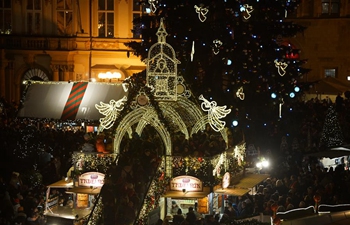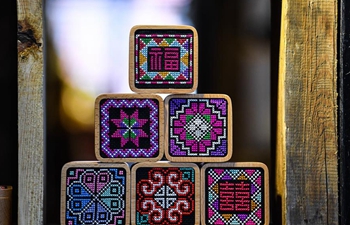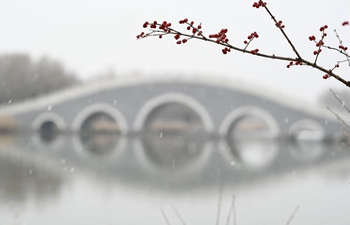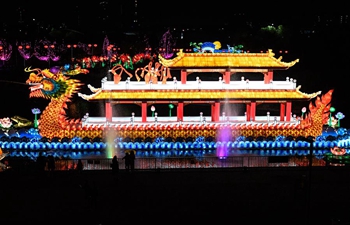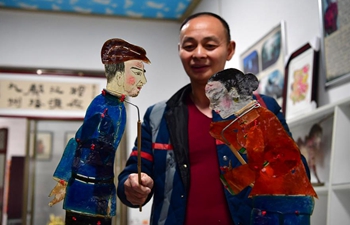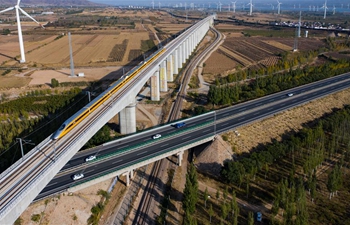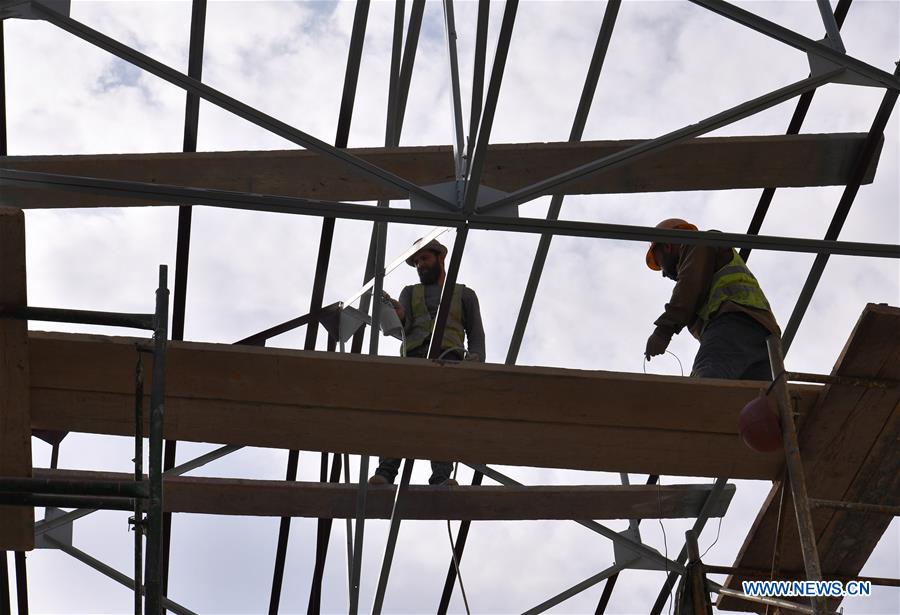 ?
?Workers rebuild the Khabiya souk (market) in old Aleppo City, north Syria, on Nov. 24, 2019. (Photo by Ammar Safarjalani/Xinhua)
by Hummam Sheikh Ali
ALEPPO, Syria, Nov. 30 (Xinhua) -- The immense devastation in the ancient marketplace of Aleppo city gives a sense of despair and bleakness to strangers. But for the Aleppo people, gone are the days of wallowing in misery as they have rolled up their sleeves and started picking up the pieces and getting back on their feet.
Damage in the formerly rebel-held eastern part of Aleppo city in northern Syria is immense but the devastation there and the difficulties created by the Western sanctions on Syria didn't discourage the local people from rebuilding home with their own hands.
Some marketplaces and squares in eastern Aleppo have been under small-scale restorations since the city was fully returned under the government control in late 2016.
Almost all the roads in the old city were reopened and cleaned up. The damage on buildings is still obvious and gives the chills when one tries to imagine what had happened there.
However, amid the destruction, life is emerging like a green leaf sprouting from a dead plant or a green oasis in the heart of a desert.
In December 2018, the Xinhua team in Damascus visited the al-Saqatiyah souk, a centuries-old Aleppo market that is part of an area listed as a World Heritage Site by the UNESCO.
At that time, workers were removing the rubble left by the war, climbing up the roof of the souk's wall to fix it.
Engineers then said it will take them at least six months to rebuild the souk. The souk was re-opened after the completion of the restoration in October.
Xinhua reporters visited the souk recently. The grayish walls and bumpy, rocky floor have turned into a glamorous, eye-pleasing venue that is a mix of the spirit of old architecture and the freshness of a new marketplace.
Inside the souk, shop owners resumed their businesses after eight years of stagnation due to the war and the presence of the rebels in that area.
Marwan Ghothi, 70, had been working in his shop in al-Saqatiyah since 1967 before he left it when the war broke out in Syria.
He is now back in his shop selling dried fruit and nuts, holding fast to the belief that tomorrow will be brighter for Aleppo.
"When the area was liberated and the problems were ended here, we were able to return with the help of the local associations. We helped each other to return to our shops and businesses and our lives turned from despair and gloominess to hopefulness," he said.
His neighbor, Ahmad Karazeh, who sells the same items, said he believes that the businesses in al-Saqatiyah will be better when the surrounding destroyed areas get rehabilitated as well.
Al-Saqatiyah is one of the few souks that have been repaired in old Aleppo but for sure it's not the last.
Currently, rehabilitation work is being carried out in the Khabiya souk, which is also located in the old marketplace of Aleppo.
Xinhua also visited the site several times before and it was once nearly deserted save for two shops; a bakery and a tailor shop.
Now, construction workers are all over the place, some standing on scaffolds, while others putting bricks on top of one another.
This souk, in particular, is being rehabilitated with the help of the United Nations Development Programme (UNDP), which is one of many other organizations interested in rehabilitating old Aleppo.
Amer Qawaf, a project manager in the UNDP, said, "We are carrying out rehabilitation process in this souk such as restoring the rocks to their original shape and showing the archaeological character of the market because this is an ancient souk."
Basel al-Zaher, a Syrian engineer supervising the project in the Khabiya souk, said fixing ancient souks is difficult as it requires lots of studies to restore the ancient areas to their original shape.
"Now around 30 percent of the shops here are open and I wish after this job is done more shops will open," he said adding that more than 100 shops will be benefited.
He noted that many companies and organizations are interested in investing in the reconstruction of old Aleppo, noting that there is a problem in funding the restoration projects as a result of the Western sanctions in Syria.
"It would be extremely difficult to rebuild the entire old quarter of Aleppo if the Western sanctions on Syria remained in place. "
"However, the people who can work are available and so are the contractors and engineers. Also, the money is available but it cannot be transferred to Syria due to the sanctions," he said.
He said next month, the construction will begin in the Khan al-Harir, or the Silk Market, which dates back to the 16th century.







